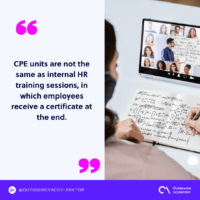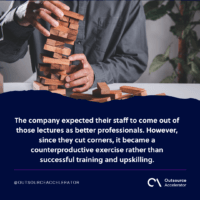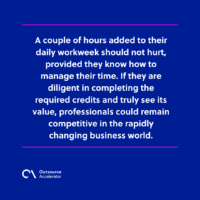Simultaneous training sessions
Big 4 accounting firm Ernst & Young (EY) has sacked dozens of employees in the United States for simultaneously attending multiple online training sessions, a practice the company considers a violation of their professional standards.
The meetings were part of a continuing professional education (CPE) requirement, with staff expected to complete 40 credits annually. Topics like “How strong is your digital brand in the marketplace?” and “Conversing with AI, one prompt at a time,” were aimed at aligning their staff with the latest trends that could affect their professions.
The incident has raised ethical questions and sparked discussions on the usefulness of these online training sessions.
A $100 million sanction
Some claim that firing the employees was too extreme and that a slap on the wrist would’ve been the proper recourse. However, CPE units are not the same as internal HR training sessions, in which employees receive a certificate at the end.
CPE courses are required for certain professions to maintain their licenses. In the case of EY, they likely sacked Certified Public Accountants (CPAs) who are monitored by a regulatory body. Failing to complete the required CPE units would not only nullify their licenses but also hurt EY’s stature and reputation.
Besides, EY has previously suffered massive consequences from dishonest employee practices. In 2022, the firm paid the U.S. Securities and Exchange Commission $100 million—the largest-ever fine for a cheating scandal. An investigation revealed that hundreds of accounting staff shared answers on professional tests, including ethics exams.
Setting up for the future
The ethical issue speaks for itself. Double-dipping in multiple trainings is the same as cheating. The company expected their staff to come out of those lectures as better professionals. However, since they cut corners, it became a counterproductive exercise rather than successful training and upskilling.
Some people feel supplementary training sessions are impractical and a waste of time because they won’t be applied to their daily tasks. Some of those sacked CPAs probably thought they wouldn’t use AI tools in auditing and related deliverables.
However, part of being a professional is bettering yourself and preparing for the future. During the Dotcom bubble, businesses braced themselves by investing in internet-based companies. They also instructed their staff to read up on this emerging technology, as it could make or break their futures.
Now that we’re in the AI boom, companies are doing the same. They do not want to be left behind, so supplementary training sessions are carefully crafted with AI at the forefront. Some employees may not use it today, but it may help them move up the corporate ladder later on.
Companies, regulatory boards, and other institutions are helping professionals through these CPE requirements. A couple of hours added to their daily workweek should not hurt, provided they know how to manage their time. If they are diligent in completing the required credits and truly see its value, professionals could remain competitive in the rapidly changing business world.
The question for your business
How do you ensure your employees are prepared for the future?





 Independent
Independent





















